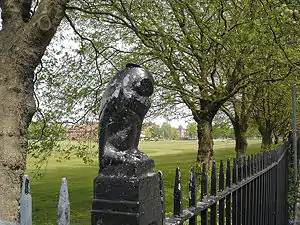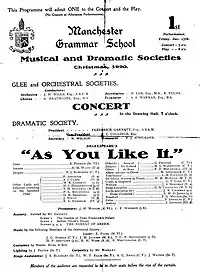List of Old Mancunians
This is a List of Old Mancunians, former pupils of Manchester Grammar School, in Manchester, England.

Owls on every post along the school's playing fields fence.
Scientists
- John Polanyi FRS (born 1929) Chemist Nobel Prize for Chemistry 1986
- Sir Walter Bodmer FRS (born 1936) Geneticist
- David Ish-Horowicz FRS (born 1948) Developmental Biologist
- Stephen Furber FRS CBE (born 1953) Computer Scientist
- Frederick William Gamble FRS (1869-1926) Zoologist
- Laurence Pearl FRS (born 1956) Structural Biologist and Biochemist
- Merton Sandler (1926-2014) professor of chemical pathology and pioneer in biological psychiatry
- Sir Algernon Thomas FRSNZ KCMG (1857-1937) professor of natural history, Auckland University College (1883-1913)
- Frederic Kipping, discoverer of Silicon Polymers, studied at the University of Manchester.
- Michael Barber FRS (1934–1991) was a chemist and mass spectrometrist.
Mathematicians
- Henry Clarke (died 1818), mathematics teacher in Manchester, Salford and Liverpool.
- Sir Michael Francis Atiyah (born 1929) is a prolific geometer who studied at the school for two years as preparation for Cambridge. He went on to attain a Fields Medal, the Abel Prize and the Order of Merit, as well as the positions of President of the Royal Society and Master of Trinity, his former college.
- Clifford Cocks and Malcolm J. Williamson were peers at the school and also Maths students at Cambridge. They achieved silver and gold medals respectively at the 1968 IMO in Moscow while studying at MGS. They both went on to become cryptographers at GCHQ, a British intelligence agency, dealing with security of communications. While both made their own contributions to cryptography in the mid 70s, their results were considered national secrets and when they were discovered independently (about four years later in both cases) they received no credit for their work. It was only in 1997 that GCHQ chose to reveal their achievements. Clifford Cocks had developed RSA encryption, used in all online commerce, but named after the three men who first published the work; likewise, Malcolm J. Williamson had developed what is now known as Diffie–Hellman key exchange, a cryptographic key-agreement protocol, named after the original publishers of the work.
- Jonathan Mestel (born 1957) is an applied mathematician at Imperial College who works on magnetohydrodynamics and biological fluid dynamics. He was the first person to be awarded chess International Grandmaster titles by FIDE in both over-the-board play and problem solving.
- John Frankland Rigby (1933–2014) was an academic at Cardiff University, a specialist in complex analysis[1]
- Edmund Taylor Whittaker (1873–1956) also went on to study at Trinity settling at Edinburgh to make significant contributions to Mathematical Physics.
Politicians
Members of Parliament
- Richard Pepper Arden, 1st Baron Alvanley, Master of the Rolls from 1788 to 1790 and MP for Hastings from 1790 to 1794.
- Frank Allaun was MP for Salford East from 1955 to 1983
- Den Dover, Conservative MP for Chorley from 1979 to 1997.
- Stanley Fink, Baron Fink - Life Peer appointed in 2011
- Neil Gerrard MP for Walthamstow from 1992 to 2010
- John Leech MP for Manchester Withington from 2005
- Harold Lever (1914–95) was a Labour Party politician and Chancellor of the Duchy of Lancaster as well as Paymaster General. He received the Order of Merit
- Sir Frank Lockwood Q.C. (1846–97) from 1863 to 1865, Liberal Member of Parliament for York 1885-1897 and Solicitor General 1894.
- Tom Normanton was MP for Cheadle from 1970 to 1987
- Alex Norris, MP for Nottingham North elected in 2017
- Michael Winstanley was MP for Cheadle from 1966–70 and for Hazel Grove in 1974
Cricketers
- Michael Atherton captained the English cricket team 54 times in the mid nineties, which then included fellow Old Mancunian John Crawley.
- Mark Chilton is a former captain of Lancashire
- John Crawley (Lancashire and Hampshire)
- Mark Lawrence (Oxford University)
- Gordon McKinna (Oxford University and Combined Services)
- Scott Richardson (Yorkshire)
- Gary Yates is the Second Team coach for Lancashire
Writers
- Donald Adamson (born 1939), Fellow of the Royal Society of Literature, historian and biographer
- William Harrison Ainsworth (1805–1882) Author of popular historical romances
- Samuel Ogden Andrew (1868-1952) Headmaster, translator of Homer, and Old English scholar
- Robert Bolt (1924–1995) Playwright; mostly remembered for A Man for All Seasons, for which he received one of his two Academy Awards
- Harold Brighouse (1882–1958) Novelist and playwright; together with Stanley Houghton and Allan Monkhouse a member of the Manchester School of early 20th-century dramatists. Author of Hobson's Choice
- Gilbert Cannan (1884–1955) Novelist and translator
- Brian Clegg (born 1955) Author of popular science books
- Alan Garner (born 1934) Children's author after whom the school's Junior Library is named. He was the first member of his family to go to a secondary school and received a full scholarship. Whilst there he was a keen sprinter
- Paul Harrison (pantheist) Founder of the World Pantheist Movement. Award-winning author of six books on environment and world poverty including the international bestseller Inside the Third World (Penguin 1979–1993)
- Thomas Kibble Hervey (1799–1859) Poet and critic
- Stanley Houghton (1881–1913) Playwright; together with Harold Brighouse and Allan Monkhouse a member of the Manchester School of early 20th-century dramatists. Hindle Wakes is his best-known play.
- Thomas Tendron Jeans (1871 – 1938), a Royal Navy medical officer who wrote juvenile fiction to show boys what life in the modern navy was really like.[2]
- Stephen Leather, thriller writer
- Frank McEachran (1900–1975), translator and writer on philosophy[3]
- Lance Parkin (born 1971) Author and scriptwriter
- Thomas de Quincey (1785–1859) Author and intellectual
- Derek Senior, planning correspondent for the Manchester Guardian
- Martin Sixsmith (born 1954) Author, journalist and radio/television presenter
- Guy Thorne pseudonym of Cyril Arthur Edward Justice Waggoner Ranger Gull (1876–1923) Journalist and novelist
- Michael Wood (born 1948), Fellow of the Royal Historical Society and broadcaster
- Lawrence Lever Journalist and editor for The Times. Founder of Citywire.
Musicians
- Graham Clark, improvising violinist
- Greg Morris, assistant organist at Temple Church and conductor
- John Ogdon, pianist
Comedians
Others

Poster for a dramatic performance from 1920 featuring actor George Coulouris; his stage debut
- Academic Alan Bookbinder, administrator and, latterly, Master of Downing College
- Actors George Coulouris, Sir Ben Kingsley, Robert Powell and Ashley Margolis
- Artist Thomas Cantrell Dugdale, John Mansbridge (1901–1981), World War II official war artist and Head of Fine Art at Goldsmiths College
- Arts Manager Alex Beard (arts manager)
- Aviator Howard Pixton, winner of the 1914 Schneider Trophy
- Broadcasters James H. Reeve, Mark Chapman
- Businessman and politician Lord Woolton
- Chemists Frederick Kipping (1863–1949), developer of silicone compounds, John Charles Polanyi (born 1929), Nobel Prize winner for Chemistry, Herbert Brereton Baker, and Sir James Baddiley FRS FRSE (1918–2008) biochemist
- Civil servant John Swanwick Bradbury, 1st Baron Bradbury
- Chief Executive of Arsenal Football Club, Ivan Gazidis
- Classical scholar A. A. Long
- Clergyman and politician, Rev. Joseph Diggle
- Diplomat Leigh Turner
- Diplomat Sir John Hanson
- Director of the London School of Economics and former Chairman of the Financial Services Authority, Lord Davies
- Doctors Rangan Chatterjee, David Oliver. Former Older Peoples Tsar in the Department of Health, President of British Geriatrics Society. Senior Visiting Fellow at the King's Fund, Professor at City University, London.
- Economist Paul Ormerod
- Fashion designer, theatrical director and stylist William Baker known for his work with Kylie Minogue
- Footballer Oliver Gill
- Hedge Fund entrepreneur Stanley Fink
- Historians Donald Adamson, Michael Wood, Victor G Kiernan
- Richard Hollins Murray, inventor of the reflective lens (the inspiration for cat's eyes used in road markings), owner and restorer of Dinmore Manor, Herefordshire.[4]
- Journalists Dominic Carman, Michael Crick, Faisal Islam, Alexander Gault MacGowan, Tim Samuels and Jim White
- Judge Sir Robert Booth (judge)
- Judge Sir Charles Mantell
- Master of University College, Oxford, Sir Ivor Martin Crewe
- Musicologist, critic and actor Christopher Webber
- Opera and theatre director Steven Pimlott
- Poets Samuel Bamford and Mobeen Altaf
- Principal of King's College London, Sir Ernest Barker
- Principal of Brasenose College, Classical Scholar Alan Bowman
- Psychologist and philosopher Daniel Berlyne[5]
- Theatre and film director Nicholas Hytner
- Theatre director and Shakespearian academic Ben Iden Payne
- Vice-Chancellor of the University of York, Professor Brian Cantor
- Victoria Cross recipient, William Thomas Forshaw was a teacher at the school
- Leon Simon, President of the Hebrew University of Jerusalem
- Simon Walsh, Barrister and Alderman of the City of London
- Joseph Wood, headmaster of Tonbridge School and Harrow School[6]
References
- John Frankland Rigby (obituary) at cardiff.ac.uk, accessed 2 May 2019
- University of London (487). "Graduates and Undergraduates". University of London: General Register: Part III: May 1st 1901. London: University of London. p. 324.
- On Translating Nietzsche into English at archiveshub.ac.uk, accessed 1 May 2012
- Dinmore Manor and the Commandery of the Knights Hospitaller od St John of Jerusalem at Dinmore, Herefordshire (4th ed.). Hereford: The Trustees of Dinmore Manor. 1991. p. 33.
- Konečni, Vladimir J. (1978). "Daniel E. Berlyne (1924–1976)". American Journal of Psychology 91 (1): 133–137. Retrieved 2014-03-29.
- "The Rev. Joseph Wood, D. D." in The Spectator dated 5 November 1898, p. 3
This article is issued from Wikipedia. The text is licensed under Creative Commons - Attribution - Sharealike. Additional terms may apply for the media files.